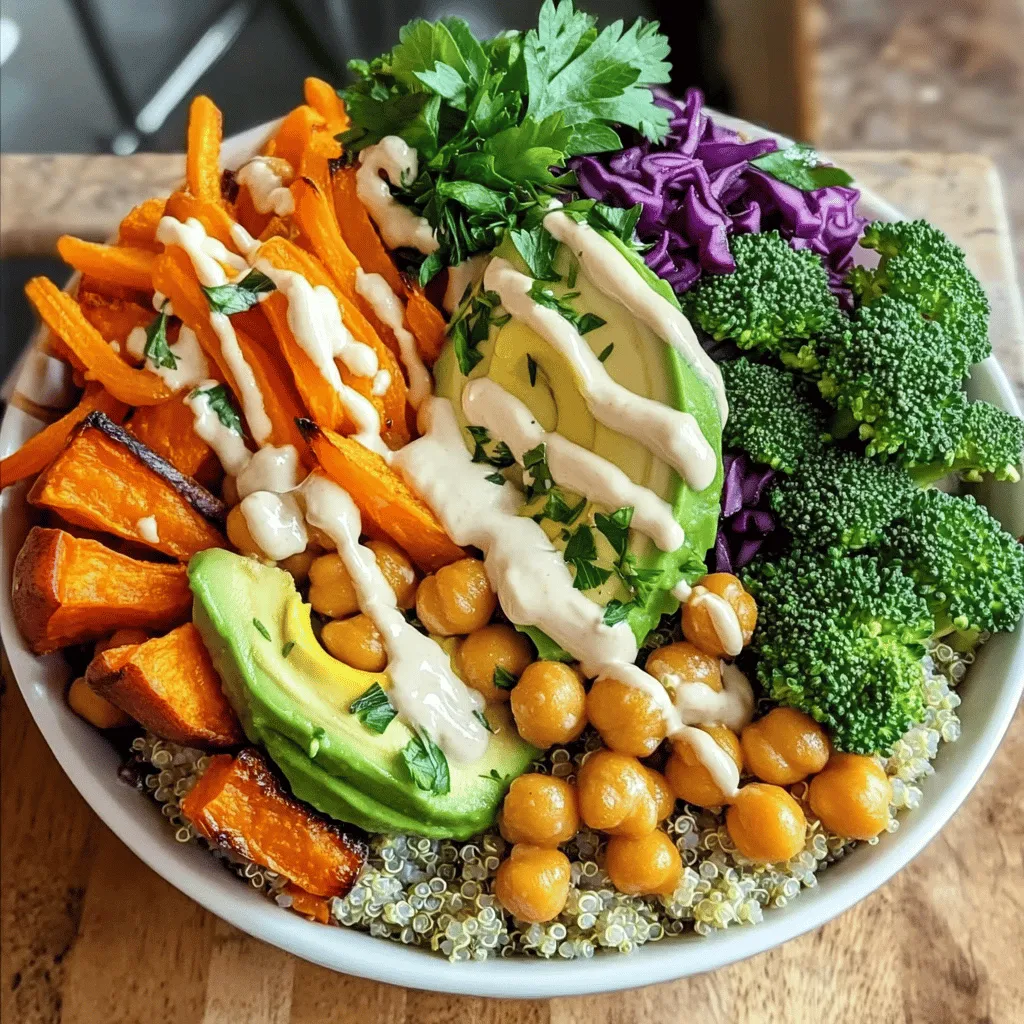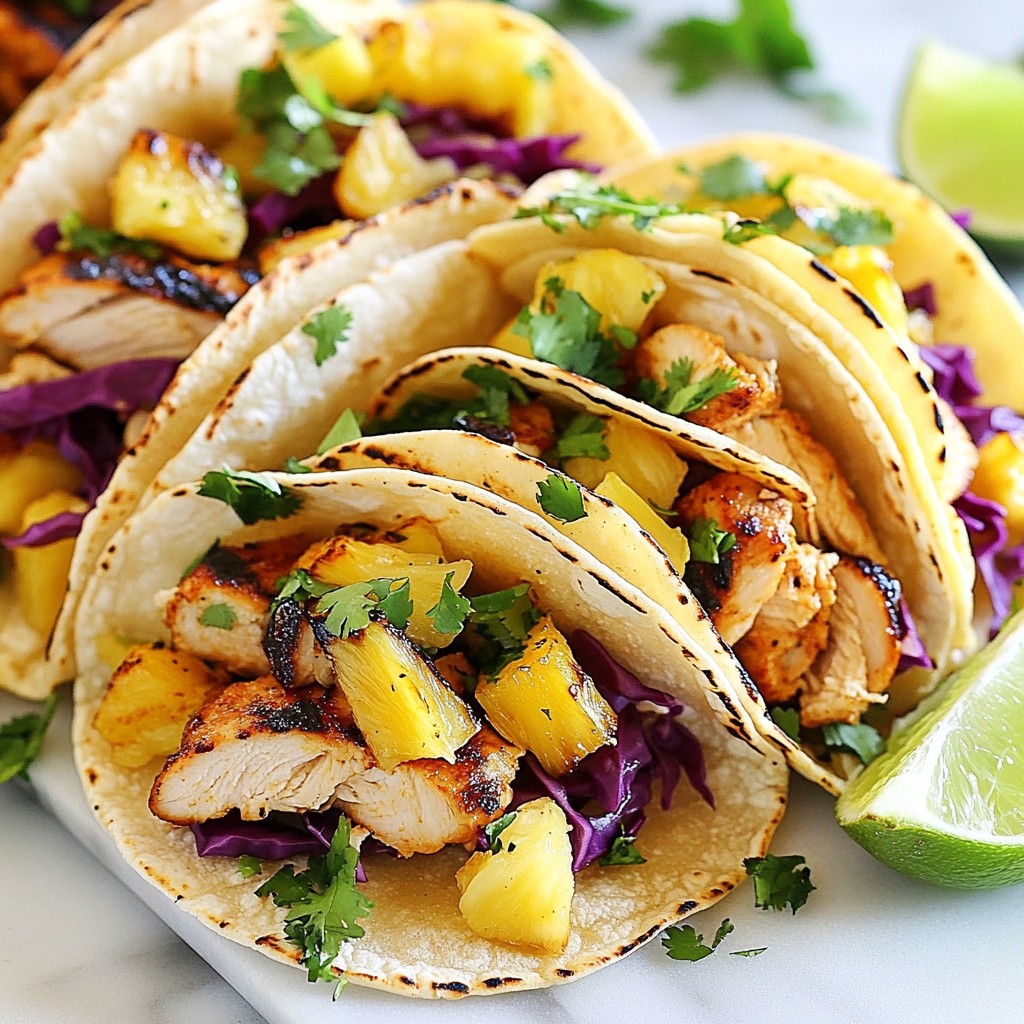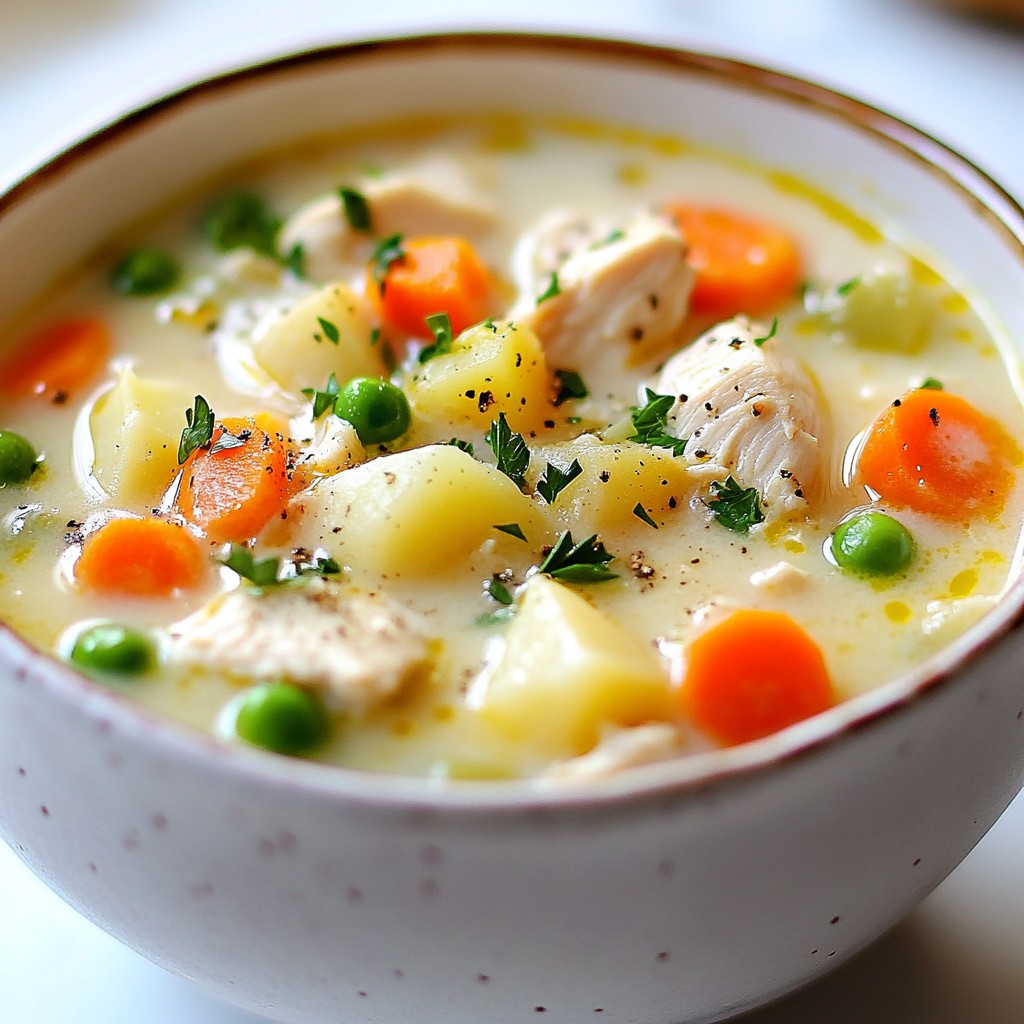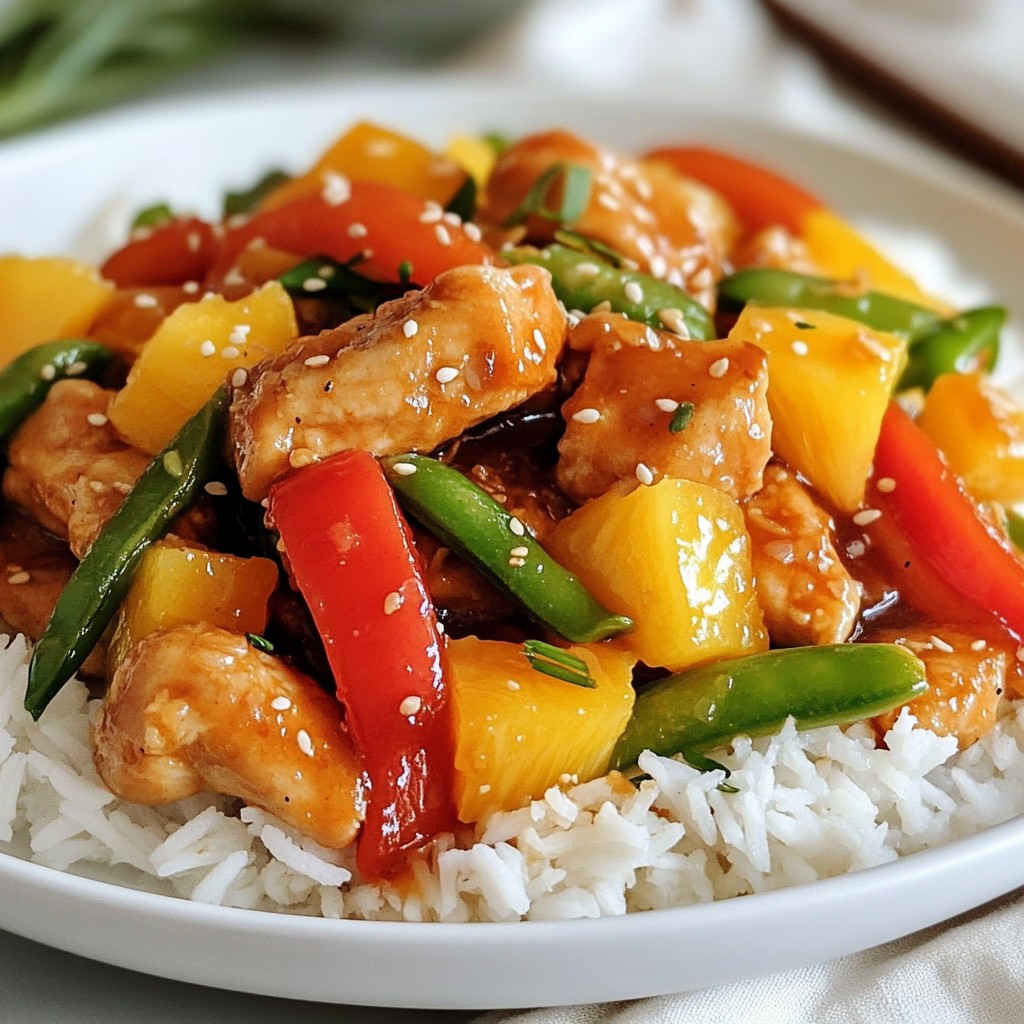Looking for a nutritious meal that boosts your health? Say hello to the Vegan Buddha Bowl! This vibrant dish combines wholesome ingredients like quinoa, fresh veggies, and proteins, creating a balance of flavors and textures. In this guide, I’ll walk you through the essential components, cooking tips, and customizable options that make this bowl not only delicious but also packed with nutrients. Let’s dive in and create your perfect Vegan Buddha Bowl!
Ingredients
Essential Ingredients for Vegan Buddha Bowl
– 1 cup quinoa, rinsed
– 2 cups vegetable broth
– 1 medium sweet potato, diced
– 1 cup chickpeas, drained and rinsed
– 1 cup broccoli florets
– 1 avocado, sliced
– 1 carrot, julienned
– 1 cup red cabbage, thinly sliced
– 2 tablespoons tahini
– 2 tablespoons lemon juice
– 1 tablespoon maple syrup
– Salt and pepper to taste
– Fresh parsley for garnish
The foundation of your Vegan Buddha Bowl is simple yet packed with flavor. Quinoa is a great base. It adds a nice nutty taste and is full of protein. Fresh vegetables give color and crunch. Sweet potatoes and chickpeas bring heartiness.
Optional Ingredients to Customize
– Additional grains like brown rice or farro
– Extra toppings such as nuts or seeds
– Dressing variations like balsamic or spicy sauces
Feel free to mix things up! Add other grains if you like. Extra toppings can give your bowl a fun twist. Explore different dressings to match your taste.
Nutritional Information
– About 400 calories per serving
– Contains 15g protein, 60g carbs, 15g fat
– Packed with vitamins A, C, and fiber
This bowl is not just tasty; it’s also healthy. The sweet potato is rich in vitamins. Broccoli offers antioxidants. Chickpeas boost protein, making it a great meal for energy. The mix of flavors and textures makes each bite exciting.
Step-by-Step Instructions
Cooking the Quinoa
First, rinse the quinoa under cold water. This helps remove any bitter taste. In a medium pot, combine the rinsed quinoa with two cups of vegetable broth. Bring this mixture to a boil. Once boiling, reduce the heat, cover, and simmer for about 15 minutes. The quinoa will absorb the broth and become fluffy. Set it aside while you prepare the other ingredients.
Roasting Vegetables
For the sweet potatoes and chickpeas, start by preheating your oven to 400°F (200°C). Dice one medium sweet potato into small cubes. In a bowl, toss these cubes with drained chickpeas, a drizzle of olive oil, salt, and pepper. Spread them out on a baking sheet. Roast them for 20 to 25 minutes. Keep an eye on them to ensure the sweet potatoes get tender and the chickpeas become slightly crispy. This step adds a great texture and flavor to your bowl.
Blanching the Broccoli
Blanching the broccoli is key to keeping its bright green color and crunch. Start by boiling water in a small pot. Once boiling, add the broccoli florets and let them cook for 2 to 3 minutes. This quick cooking time helps preserve the nutrients. After blanching, quickly transfer the broccoli to an ice bath to stop the cooking. Drain it well, and set it aside.
Making the Dressing
To make the dressing, combine tahini, fresh lemon juice, maple syrup, salt, and pepper in a small bowl. Use a whisk to mix them together. If the dressing is too thick, add a small splash of water. This will help you achieve a nice drizzling consistency. The dressing adds a creamy and tangy flavor to your bowl.
Assembling the Bowl
Now comes the fun part—assembling your vegan Buddha bowl! Start by placing a generous scoop of quinoa at the bottom of each serving bowl. Next, layer the roasted sweet potatoes, crispy chickpeas, blanched broccoli, sliced avocado, julienned carrot, and thinly sliced red cabbage on top. Arrange each ingredient in an artistic manner for a beautiful presentation. Drizzle the tahini dressing over the top and garnish with fresh parsley. This step makes your meal not just tasty, but also a feast for the eyes.Enjoy your colorful creation!
Tips & Tricks
Perfecting Your Vegan Buddha Bowl
To make the best vegan Buddha bowl, start by choosing fresh vegetables. Look for vibrant colors and firm textures. You want veggies like sweet potatoes, broccoli, and red cabbage. These choices add flavor and crunch.
Balancing flavors is key. Combine sweet, salty, and tangy elements. The sweet potato brings sweetness, while chickpeas add protein. A drizzle of tahini dressing ties it all together with creamy goodness.
Making It a Meal Prep Option
Batch cooking is a smart way to make meal prep easy. Cook a large pot of quinoa or rice at once. Store it in containers for later use. You can also roast extra sweet potatoes and chickpeas.
For storage, keep everything in airtight containers. This helps keep your food fresh. A good rule is to eat leftovers within four days.
Presentation Ideas
The look of your Buddha bowl matters. Use colorful dishes to make a feast for the eyes. Bright plates enhance the food’s appeal.
Garnish your bowl with fresh herbs or seeds. A sprinkle of sesame seeds or parsley can add flair. This small touch makes a big difference in presentation.
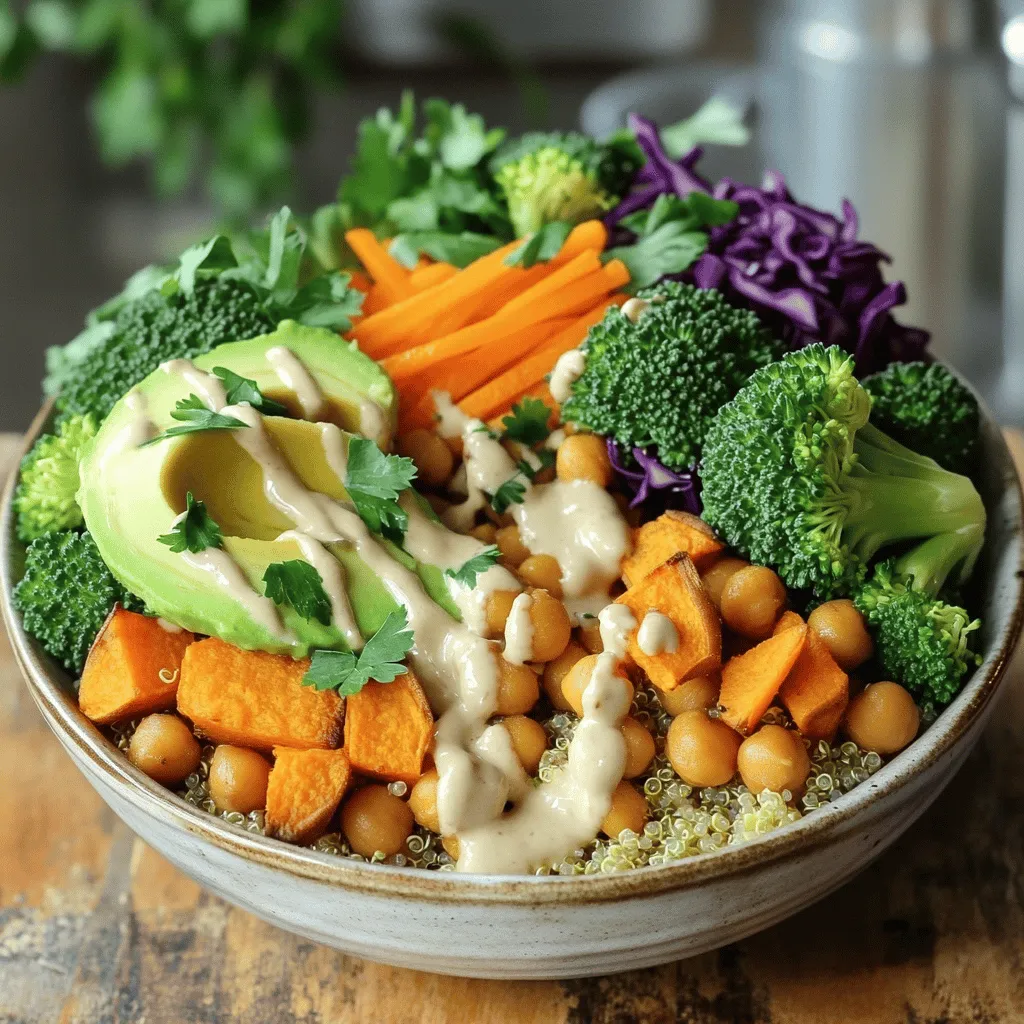
Variations
When making a Vegan Buddha Bowl, you can mix it up with different grains.
Different Grain Bases
– Brown rice: This whole grain adds a nutty flavor. It’s filling and pairs well with many toppings.
– Farro or barley: These grains bring a chewy texture. They also boost nutrition with fiber and protein.
Protein Alternatives
You can switch up the protein in your bowl.
– Tofu or tempeh: These soy products soak up flavors well. They add creaminess and heartiness to your meal.
– Lentils or beans: Both options offer plant-based protein. They are also rich in fiber and keep you full longer.
Seasonal Ingredients
Using seasonal produce makes your bowl fresh and exciting.
– In spring, try asparagus or peas for a pop of color.
– In summer, add juicy tomatoes or zucchini.
– In fall, roasted squash or kale enhances warmth and comfort.
– In winter, root veggies like carrots and parsnips are great choices.
Adapting the recipe throughout the year keeps meals fun and varied.
Storage Info
Storing Leftovers
Store your Vegan Buddha Bowl in an airtight container. This keeps it fresh. Refrigerate it within two hours of making it. Leftovers last up to three days in the fridge. To avoid sogginess, keep dressing separate until serving.
Freezing Options
You can freeze parts of your bowl for later use. Freeze quinoa, roasted sweet potatoes, and chickpeas separately. Use freezer-safe bags or containers. When ready to eat, thaw in the fridge overnight. Reheat quinoa in a pot, and roast veggies in the oven for crispiness.
Meal Prep Storage
Choose glass containers for meal prep. They keep food fresh and let you see what’s inside. Layer your bowl with quinoa on the bottom, then veggies, and top with avocado and dressing. This keeps everything fresh and pretty.
FAQs
What is a Vegan Buddha Bowl?
A Vegan Buddha Bowl is a colorful meal packed with nutrients. It typically includes a base of grains, fresh veggies, and proteins. You can use quinoa, brown rice, or farro for the grain. For veggies, think of sweet potatoes, broccoli, carrots, and red cabbage. Chickpeas or tofu add protein, while a tasty dressing brings it all together. This bowl is not just food; it’s a feast for the eyes and the body.
Can I substitute any ingredients?
Yes! You can swap ingredients based on your taste or what’s in your pantry. Try brown rice instead of quinoa. For veggies, you could use spinach, kale, or bell peppers. If you do not like chickpeas, lentils or black beans work well. For the dressing, you could use nut butter instead of tahini. The key is to keep it colorful and full of flavor.
How can I make it gluten-free?
To make your Vegan Buddha Bowl gluten-free, choose grains like quinoa or rice. Avoid barley or wheat-based grains. For the dressing, ensure your tahini is gluten-free. You can also make a simple lemon and olive oil dressing. Always check labels for hidden gluten in pre-made sauces or dressings.
How long does it take to prepare?
Making a Vegan Buddha Bowl takes about 50 minutes. Here’s the breakdown:
– Prep Time: 15 minutes
– Cooking Time: 35 minutes
Cooking the quinoa and roasting the veggies can happen at the same time. This makes the process faster and easier.
What are the health benefits of a Vegan Buddha Bowl?
A Vegan Buddha Bowl is full of health benefits. It offers a good mix of fiber, protein, and vitamins. Here are some benefits:
– High in Fiber: Quinoa, veggies, and legumes help with digestion.
– Rich in Nutrients: Each ingredient brings its own vitamins and minerals.
– Plant-Based Protein: Chickpeas and quinoa provide protein without meat.
– Healthy Fats: Avocado and tahini add healthy fats for heart health.
Eating this bowl can help improve your health while tasting great.
In this article, we explored how to create a Vegan Buddha Bowl. We discussed essential ingredients like quinoa, fresh vegetables, and protein sources. You learned how to customize your bowl with various grains, toppings, and dressings. We also shared tips for perfecting flavors, making meal prep easier, and storing leftovers.
In the end, a Vegan Buddha Bowl is versatile and nutritious. You can have fun with it. Enjoy experimenting with colors and flavors to make each bowl unique!

